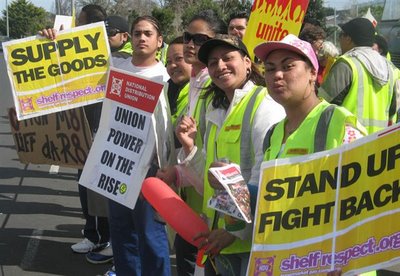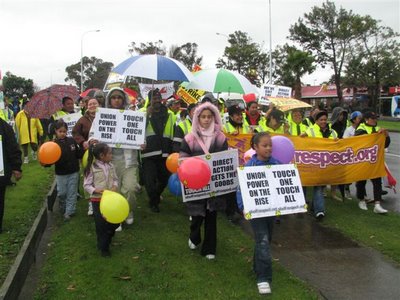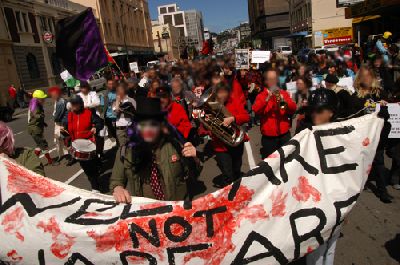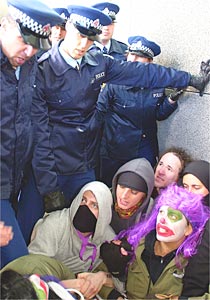I've written before about the experience of waiting for news. In New Zealand waiting for news generally means listening to the National Radio news bulletin every hour on the hour. There are six pips and then they tell you what's happened in the last hour. Usually it's OK if you miss some, usually not that much happens between one hour and the next. But, sometimes, when you really care about what happened it matters desperately and you never miss a bulletin.
From the 28th August to the 21st September 600 workers were locked-out of their jobs. I listened to the news so obsessively that when the lock-out ended I realised I'd forgotten how to listen the news with mild curiosity. I am going to write a brief history of that struggle, because I think remembering that we can win if we work together is an important part of the battle.
There are 600 workers who run the distribution centres for Progressive Enterprises. Progressive run three separate supermarket chains, so the distribution centres receive goods from the suppliers and distribute them to the different supermarkets. In 2003 Progressive Enterprises closed down their Auckland and Christchurch distribution centres, made all the workers redundant, and then reopened in another location, rehiring the workers on lower pay. They weren't able to do that at the third distribution centre (in Palmerston North), because they either weren't able to find a new site, or weren't able to get rid of the lease. So workers in three different locations, doing exactly the same work, were paid three different rates. Workers were paid $2 an less in Christchurch than they were in Palmerston North, for doing exactly the same job.

This picture comes from Friday 25 August, the workers at the three distribution centres went on strike in support of their claim for a single collective agreement and one rate of pay. I was only vaguely aware of it at the time. I'm a unionist - I support striking workers - so I was excited . But I didn't pay that much more attention than I'm currently paying to the workers at TVNZ who are currently taking industrial action.
That all changed on the Monday (28 August). Progressive Enterprises responded by locking the workers out. All the workers were locked out (without pay), unless they dropped the claim for a single collective agreement. The company started putting out ridiculous lies - they said the union was demanding a 30% payrise. Lock-
At the start it was about Woolworths distribution, going into the second week it was about New Zealand workers in general, there was a lot of members of the public that saw that, and rallied behind us.
That's from
Shane Cooper, a worker at the Palmerston North distribution centre.
That was my experience as well, although I was paying attention during the first week of the lock-out I still saw it as an issue for that site. When the company and the union went into mediation later in that week I haunted the radio (and peppered anyone who might tell me what was going on with text messages asking if there was any progress), because being locked-out is an awful experience.
The families who were locked out were facing an indefinate time without wages. For the first week, before substantial funds came in, the union couldn't give out money. It just paid the most urgent bills people had, provided food (many donations of kind came in - but it cost $1000 a day just for food on the Auckland picket line), and tried to defer the rest (all the major banks gave mortgage holidays). The stress that that uncertainty puts on people is hard to imagine. Most people can't afford to be without work for weeks at a time, particularly not knowing when that time will end. There were some families where the locked-out workers was the only wage-earner, other families where both parents worked in the distribution centres.
It was frustrating, being in Wellington as that first week came to an end. We were desperate to help, but didn't know how. We had no distribution centre near by (Palmerston North was two hours drive away). We went to a picket outside one of the Supermarkets (the retail workers at those supermarkets were also negotiating for a wage increase, but they weren't locked out).
After a week of closed distriubtion centres the supermarket shelves started emptying. It was really exciting to go in there and see a sign say "We apologise if your favourite product is out of stock." The situation was really odd as well. The one product the supermarkets had in abudance was budget toilet paper. The managers had obviously been told that they didn't want the shelves to look empty, so everywhere they were short the shelves were filled with toilet paper. You'd be looking at the biscuit aisle and in between the Tim-tams and the Shrewsberries there'd be Toilet Paper.
The second week things started to get serious, both on their side and on ours. In New Zealand if workers are on strike, or locked-out, it's illegal to hire or contract any one else to do their work. Progressive were breaking this law in two ways, one they were getting suppliers to deliver supplies directly,* and two they had hired Linfox, a supply chain company, to distribute the goods in the meantime. Christchurch and Auckland workers were 100% union, and stayed strong throughout the lock-out. However, Palmerston North was less than 100% union, and also had the least to gain from a settlement, since they were already on the highest rates.**
At the beginning of the second week workers in Palmerston North started resigning the union and going back. The only way the company would let them back to work was if they resigned from the union, and therefore renounced their claim for a single collective agreement. By Tuesday 5 September (just over a week after the lock-out began) enough workers went back that the company could reopen the Palmerston North distribution centre with scab trucks. They did this with the aid of the police - who once again made it clear which side they were on in industrial disputes.
By this time the fight was for all New Zealand workers, and it was clear that the company was out to destroy the union. Progressive enterprises is an Australian based company that is Australasia's largest private sector employer. It's cheif executive Roger Corbett earns $8.5 million a year (Australian), the claim the workers were seeking would have cost a fraction of that. Australia has recently passed extremely anti-worker employment legislation, and it seemed they were testing their tactics in New Zealand. Progressive and Walmart seem to have a friendly relationship, and have had management exchanges, so they can learn how to screw over workers together.
The intractability of the company made it a union-wide issue. If they could break such a well organised site, they could break anyone So many times over the next few weeks someone would say to me "thanks for what you're doing" and I'd say "it's just we have to win this you know?" and they'd nod.
You see the New Zealand union movement hasn't been known for fighting for a number of years. In 1991 the National government introduced extremely anti-worker legislation. Despite a mandate from around the country the central union organisation the Council of Trade Unions wouldn't call a general strike. The next decade saw stagnation and decreases on wages, attacks on unions, and workers and unions to afraid to stand up for themselves. Just now, 15 years later, the union movement is starting to fight again.
Laila Harre, the current secretary of the National Distribution Union (the main union in the distribution centre) challenged the incumbent and won in that rare thing, a contested union election.*** She was personally attacked during the lock-out and one newspaper editorial blaming the whole thing on her personal ambition to lead the CTU (quite how she'd have the power to make the company lock-out the workers is unclear). She didn't drive the workers to the picket lines, the actual story does her a lot more credit. When, after the first 24 hours on strike the workers decided not to go back, she recognised that this was their decision to make and her job to work to make that decision work.
In terms of union leadership this was a huge step forward. I believe that if we'd lost this the union movement wouldn't have fought for anything, and that would have been the death blow (union movement's are always much stronger when they fight).
I only got up to the Palmerston North picket-line once, on my way somewhere else. The camp was amazing and it was great to meet the workers. I came about lunch-time and they offered me lunch, I demurred - I hadn't had lunch, but I didn't want to take food that was meant for someone without an income. They insisted and one guy said to me "We can't stop the trucks going in, and we can't stop the trucks coming out, but we can give you hospitality, and cook good food"
Those workers couldn't stay out alone - the union movement came in behind almost immediately, giving substantial amounts of money to the lock-out fund (over a hundred thousand of dollars). That was great, but the public reaction was something else. The only thing we could really do in Wellington was collect money, so we threw ourselves into it and got to see, first hand, the level of support out there for the locked out workers.
We were just out there on the street, rattling our buckets, and the response was amazing. People would go to get money out so they could give it to us; people would empty their wallets into the buckets; after a couple of hours our buckets were heavy with coins and we'd raised over a thousand dollars. It was really clear to me that the people of Wellington understood that this was a fight for all New Zealanders. The street collecting was just one way people were contributing, there was a 0900 phone line, and a bank account people could put money into. Ordinary workers gave over a hundred thousand dollars to the lock-out fund.

This picture comes from the Auckland rally to support the locked-out workers, there were rallies like this all over the country.
I had my first 'We're going to Win' moment on Friday 8 September two weeks into the lock-out.**** The Council of Trade Union called a special meeting to decide what the union movement could do to help. As well as contributing substantially more money, people began to talk about solidarity action (which is illegal in New Zealdand). The Maritime Union of New Zealand and the Maritime Union of Australia, both started talking about refusing to work on Progressive cargo, that would have broken the company. Just the possibility made us feel so much stronger. Unions were starting to pledge serious funds. The richer workers, from well organised workplaces, agreed to pay $20 a week for the duration (that's how I began to think and talk, everything was for the duration). These were work places with thousands of workers, so it would be $20,000-$40,000 a week.
It was also becoming clearer and clearer that the company was breaking the law and the union was going to be able to sue.****** There was even the possibility that the whole lock out was illegal. By the third week I really did believe we were going to win, with the legal options and the industrial options, we were strong and the company wasn't going to break us. It was just a question of how long, because those workers were hurting. Although we'd raised a lot, it doesn't go very far when it was split 600 ways.
These cases were due to go to court Tuesday 19 September, they didn't - because the company blinked. They agreed to go back into bargaining and post-pone the court date. Then, for the first time, the company actually agreed to negotiate. It took all day and all night (negotiations finished sometime between 3.30am and 4.30am the next morning), but they pieced together a deal. It was a three year deal for three seperate collective agreement, but the rates were aligned so by the end of two years the workers would have pay parity.
Two days later, on the 21st of September the workers voted to ratify this deal, and the day after that the lock-out formally ended and the workers returned to work.
To fight and win, is the most amazing experience. The union didn't choose the fight, the company did, which made it even sweeter that we won. I say we, but I don't work in the distribution centre, and while this was a victory for everyone, it's the workers who did the hard work.
My favourite story from the strike came from the partner of a worker in Palmerston North. She had recently been made redundant, so they were in a particularly difficult position. Her 7 year old daughter went to visit her grandmother (who worked in a nearby factory) during the grandmother's afternoon smoko. The little girl was standing on the pavement asking, and her grandmother asked what she was doing. She replied "I'm on strike, I'll wave at them and they'll toot at me, because they agree."
So with the risk of sounding like a placard - dare to struggle, dare to win:

*They had legal advice that said something along the lines of in order to keep this legal avoid talking about payment until after the lock-out is ended.
**In New Zealand you can't close a shop, so people join the union on an individual basis not a worksite basis.
***As one official put it "Democracy has broken out in the union movement."
****Yes this is a Buffy reference, sorry about that.
******Yes I have a problem with the company breaking the law and don't have a problem with the union breaking the law. It's not because I'm a hypocrite, it's because I've picked a side - deal with it.





